[[{“type”:“media”,“view_mode”:“media_large”,“fid”:null,“attributes”:{“class”:“media-image alignright size-full wp-image-1606”,“typeof”:“foaf:Image”,“style”:“”,“width”:“100”,“height”:“100”,“alt”:“New York Times”}}]]There are a number of factors at play when it comes to determining the effect exercise has on memory, reports The New York Times, in its review of a recent study released by Dartmouth researchers.
As the Times article explains, Dartmouth researchers have found that genetic make-up, as well as the frequency of and age at which a person exercises, play a role in the effect that exercise has on memory. David Bucci, an associate professor in the department of psychological and brain sciences, and one of the study’s authors, explained to The New York Times that some people’s ability to recall objects may “respond less robustly” to exercise than other people’s if their genetic makeup doesn’t promote the release of BDNF (brain derived neurotrophic factor).
Also, after comparing the pre- and post-testing results of the experiment’s control groups of exercisers and non-exercisers, Bucci explained that “exercise generally enhances the ability to remember,” adding, “The current data strongly suggests that people should be physically active.”
Read the full story, published 5/30/12 by The New York Times.
